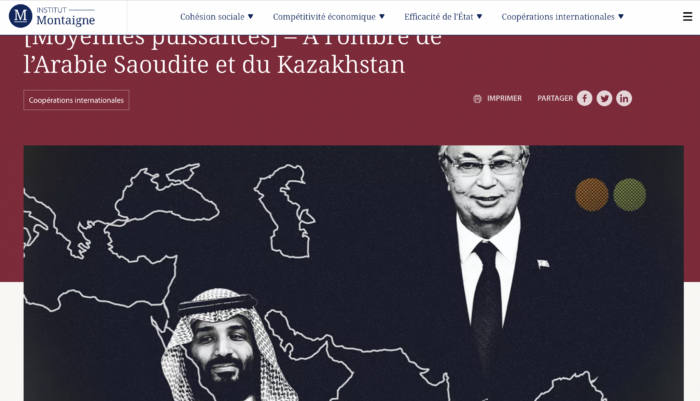ASTANA – The Institut Montaigne, a think tank based in Paris, published an article on Aug. 9 titled [Middle Powers] – In the Shadow of Saudi Arabia and Kazakhstan.

In the fourth episode of his summer series, “In Search of Middle Powers,” Michel Duclos, Special Advisor and Resident Senior Fellow on Geopolitics and Diplomacy at the Institut Montaigne, examines the roles of Saudi Arabia and Kazakhstan. He explores the potential for Riyadh and Astana to join a diplomatic initiative that unites middle powers to contribute to a more stable and secure international order.
The first part of the article is devoted to Saudi Arabia.
Kazakhstan, the partner of the Central Asian steppes
Kazakhstan is not among the richest powers in the world and is not a member of the G20. However, its economy positions it as a leading power in Central Asia, with a GDP that accounts for 50% of the region’s total. The country has significant reserves of raw materials, including oil, coal, uranium, chrome, manganese and copper, and plays an important role in the energy supply of its partners, including in Europe.
According to the article, Kazakhstan’s geographical position and vast land area, which make it a hub at the crossroads between China and Europe, predispose it to a role that extends beyond mere regional ambitions. Marie Dumoulin, a diplomat and expert on the region, and director of the Wider Europe program at the European Council on Foreign Relations (ECFR), articulates this by stating, “What places Kazakhstan in the category of middle powers is its desire to implement a foreign policy agenda that is not only regional but global, particularly on climate and environmental topics.”
Duclos notes in his article that Kazakhstan and France intend to host the One Water Summit this year.
“Kazakh diplomacy is also active in non-proliferation and management of civil nuclear power. Kazakhstan is the world’s leading uranium producer – 40% of global production – although it does not have a single nuclear power plant on its territory (a referendum on this issue is planned for this autumn). The country also practices its role as a mediator, including through the Astana Process on Syria and by hosting talks between Armenia and Azerbaijan earlier this year,” the author writes. He also mentions Kazakhstan’s Congress of Leaders of World and Traditional Religions, held every two years, and the Astana International Forum, held for the first time in 2023.
According to Duclos, to achieve its ambitions, Kazakhstan should address two challenges. First, it needs to strengthen internal unity. Kazakhstan is home to 140 different ethnic groups. At the time of independence, Kazakhs represented only 35% of the overall population. Today, they make up approximately 70%. “It is one of the prides of the country’s leaders to have succeeded in building a Kazakh national state that integrates ethnic diversity and multi-confessionalism,” said Marie Dumoulin.
Politically, the country was ruled for three decades by President Nursultan Nazarbayev and his clan, who retained strong influence even after Kassym-Jomart Tokayev became President in 2019. The January unrest in 2022 allowed President Tokayev to consolidate his power. He was re-elected in November 2022 and is now pursuing ambitious reforms.
The second challenge for Kazakhstan is to achieve emancipation from Russia. This is a multifaceted task that involves diversifying its economy. According to Marie Dumoulin, 11.5% of exports and 42% of imports currently depend on Russia. The economies of Russia and Kazakhstan are closely linked, as Kazakhstan is a member of the Eurasian Economic Union (EAEU), which allows for the free movement of capital, labor and services with Russia. In an effort to forge its own path, Kazakhstan launched the Astana International Financial Centre (AIFC) in 2018, aiming to open up the country to international finance, following the model of Dubai. Since the war in Ukraine, Astana has sought to provide an alternative to the Moscow stock exchange and transform the country into a startup nation. Kazakhstan also plays a leading role in cryptocurrencies, ranking second only to the United States in terms of bitcoin mining. Additionally, the country is focusing on agriculture, agrifood and, most notably, information technology.
However, Marie Dumoulin notes that Kazakhstan suffers from the usual “curse of natural resources,” where it is tempting for local entrepreneurs to exploit rather than invest.
China’s influence is also growing, with strengthened trade ties. It was in Astana that Chinese President Xi Jinping announced the launch of the Belt and Road Initiative (BRI). However, as Marie Dumoulin notes, President Tokayev clearly understood that “his Russian and Chinese partners will not provide his country with a sufficiently broad base to ensure its sovereignty.” As a result, Kazakhstan seeks to pursue a multi-vector policy, balancing its relationships without distancing itself from Moscow and Beijing. This approach involves strengthening ties with India, Türkiye, and the Persian Gulf countries, as well as Europe, in a bid to attract investments from these partners.
Conflict in Ukraine
The invasion of Ukraine was a real “reality test” for Kazakh leaders. They largely identify, for obvious historical reasons, with Ukraine’s fate. However, in the event of Russian aggression against their country, “they cannot count on a reaction from the population as unanimous as in Ukraine,” according to Marie Dumoulin. They are also aware that, unlike Ukraine, they do not have Europe as a close alternative to Russia, nor the United States—except at another level—or China, which poses its own challenges. This helps explain why President Tokayev is trying to navigate cautiously, applying Western sanctions while avoiding provoking Russia.
Overall, Kazakhstan is a middle power that does not align itself with the Global South, sees itself as European or at least Eurasian, and is trying to make its own voice heard without antagonizing its larger neighbors. Joining the OECD [Organization for Economic Co-operation and Development], which it is working towards, would be one way for Kazakhstan to achieve some of its goals.
